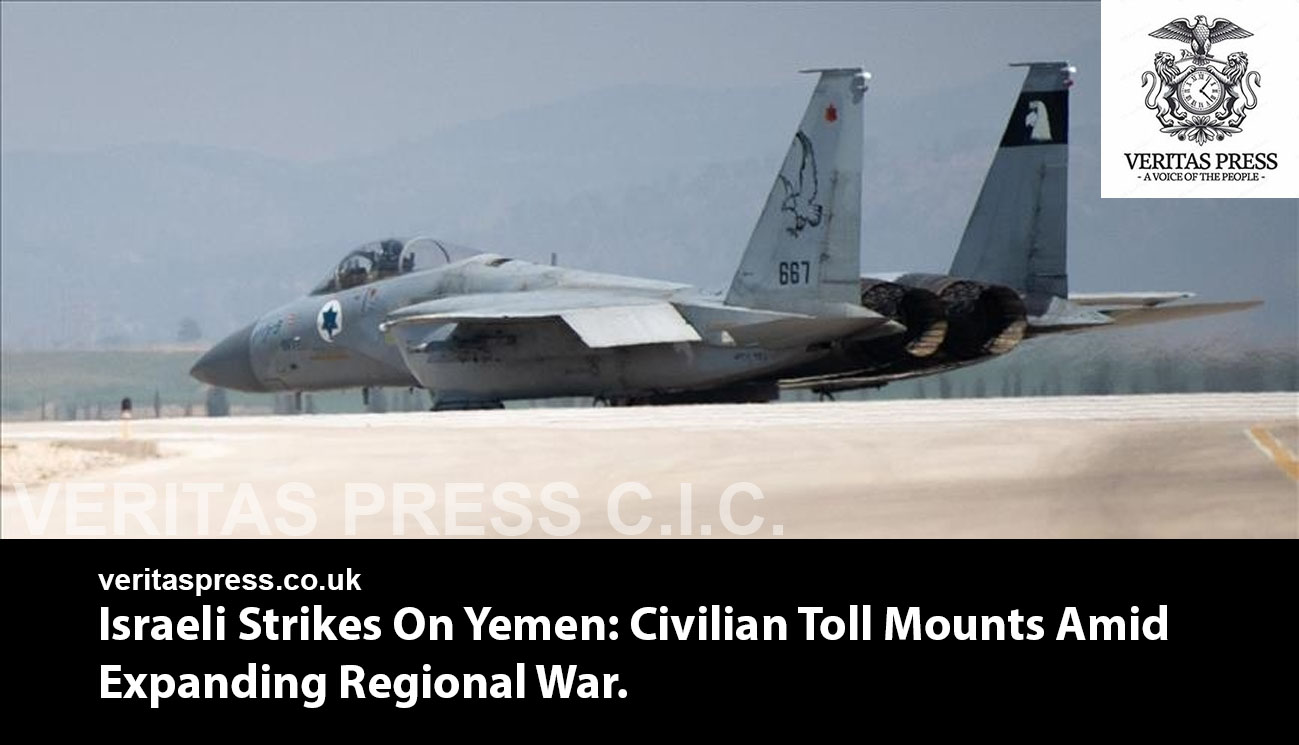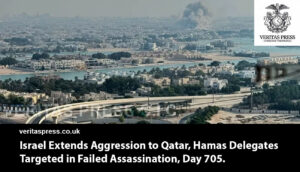Press Release: Veritas Press C.I.C.
Author: Kamran Faqir
Article Date Published: 10 Sept 2025 at 18:47 GMT
Category: Middle East | Yemen | US-Israel At War
Source(s): Veritas Press C.I.C. | Multi News Agencies
SANAA/AL-JAWF — Thick plumes of smoke rose over Sanaa’s 60th Street on Wednesday afternoon, after Israeli fighter jets launched a new wave of airstrikes on Yemen’s capital and the northeastern province of Al-Jawf. The Houthi-run Health Ministry reported at least nine killed and 118 wounded, warning that the toll is likely to rise as emergency crews dig through rubble in densely populated neighbourhoods.
“We were pulling survivors with our bare hands. Children were trapped under collapsed concrete,” said Mohammed al-Mutawakkil, a volunteer with Sanaa’s civil defence, who described scenes of panic at the targeted medical facility. “It was not a military site. It was where people came for treatment.”
Strikes On Civilian And Government Sites:
Local media, including Al-Masirah TV, reported that Israeli warplanes hit:
- a medical facility in Sanaa,
- the Central Bank headquarters,
- a government complex in Al-Jawf’s capital, al-Hazm,
- and the offices of 26 September and Yemen newspapers.
Residents said the blast wave shattered windows across Sanaa’s al-Tahrir neighbourhood. “My family barely escaped when the ceiling collapsed,” said Samah al-Houthi, a teacher who lives near the targeted Moral Guidance Headquarters. “This is a war against civilians, not against soldiers.”
The Yemeni Oil and Gas Corporation confirmed one strike hit a fuel station serving hospitals, cutting off supplies to emergency wards already overwhelmed by cholera cases.
Israel’s Justification: Military Targets.
The Israeli army issued a statement claiming responsibility, saying the strikes “hit Houthi military camps, the Military Public Relations Headquarters, and a fuel storage facility.” Israeli Defence Minister Yisrael Katz framed the operation as retaliation:
“We promised to carry out additional strikes, and today we dealt a severe blow to Ansarallah in Yemen. Our long arm will strike terrorism wherever it poses a threat.”
Prime Minister Benjamin Netanyahu echoed the warning, linking the strikes to a Houthi drone attack on Ramon Airport days earlier. “Anyone who strikes us, we will reach them,” he declared on X.
Israeli outlets such as Ynet and the Jerusalem Post reported that missile launch pads, arms depots, and the headquarters of Houthi spokesman Yahya Saree were also targeted.
Houthi Response: Resistance Unshaken.
Ansarallah’s military spokesman Yahya Saree countered that the group’s air defences had “thwarted the bulk of the Zionist attack,” forcing some Israeli jets to retreat.
“Our air defences launched surface-to-air missiles. Some combat formations were forced to leave before carrying out their aggression,” Saree said in a statement.
Nasr al-Din Amer, deputy head of Ansarallah’s media authority, accused Israel of exaggerating its gains:
“This was nothing but a desperate attempt by a bankrupt criminal regime to claim an imaginary victory. Our operations in solidarity with Gaza will not stop.”
Hazam al-Assad, a member of Ansarallah’s Political Bureau, accused Israel of “targeting residential neighbourhoods and medical facilities in violation of all laws.”
Humanitarian Crisis Deepens:
International rights groups warned that the airstrikes further imperil Yemen’s collapsing healthcare system. Doctors Without Borders (MSF) said hospitals in Sanaa were “struggling to cope” with mass casualties while simultaneously treating cholera patients.
“This attack has pushed already overwhelmed facilities to the brink,” an MSF coordinator told Reuters, describing a shortage of fuel, antibiotics, and surgical equipment.
The Norwegian Refugee Council condemned the strikes, noting that Yemen’s civilian infrastructure has faced years of bombardment from the Saudi-led coalition, now compounded by Israel’s direct intervention.
“Yemenis have endured relentless war and famine. To hit medical facilities and homes again is unconscionable,” said NRC’s Middle East director.
Regional Escalation: From Gaza To Doha To Sanaa.
The strikes in Yemen came just 24 hours after Israel bombed a residential building in Doha, Qatar, in what officials described as a failed assassination attempt on Hamas leaders. At least six people were killed, though Hamas claimed its senior leadership survived.
The escalation reflects Israel’s widening military theatre: bombing Lebanon, Syria, Iraq, Qatar, and Yemen, while continuing its genocidal assault on Gaza, where more than 100,000 Palestinians have been killed since October 2023.
Analyst Elham Fakhro of Chatham House warned that Israel’s actions risk “igniting a regional firestorm.”
“By targeting Yemen and even Qatar, Israel is no longer just retaliating, it is opening multiple fronts in a way that makes containment almost impossible.”
International Backlash:
The strikes have also drawn diplomatic condemnation. EU Commission President Ursula von der Leyen said she would propose sanctions against Israel and a partial trade suspension, citing violations of international humanitarian law in Gaza and now Yemen.
Rights activists point to the Geneva Conventions, noting that medical facilities and civilian neighbourhoods are protected objects. “There is mounting evidence of war crimes,” said Ramy Abdu, head of the Euro-Med Human Rights Monitor.
Conclusion: A Calculated Escalation, A Manufactured War Without Limits.
The Israeli strikes on Sanaa and Al-Jawf are not isolated episodes but part of a systematic expansion of Israel’s war beyond Gaza’s borders, deliberately widening the conflict to Yemen, Lebanon, Syria, Iraq, and even Qatar. Each operation is framed by Israeli officials as defensive retaliation, yet the targets repeatedly include hospitals, homes, fuel depots, and media outlets, infrastructure whose destruction cripples civilian life far more than military capacity.
The evidence suggests a calculated pattern: by striking Yemen’s health sector, media institutions, and financial hubs, Israel is pursuing a war of attrition against societies themselves, seeking to suffocate resistance by dismantling the civilian backbone that sustains it. This mirrors the strategy deployed in Gaza, where food, water, and hospitals have become intentional battlegrounds.
Israel’s own rhetoric underscores this. Defence Minister Yisrael Katz declared, “Our long arm will strike terrorism wherever it poses a threat.”Yet when translated through the charred rubble of Sanaa’s medical stations and the bodies of Yemeni civilians, such language reveals the actions of a terrorist state, one that strikes across borders to terrorise populations and advance its expansionist project under the full watchful eye of the West and its allies.
For Yemenis, Wednesday’s bombing was another chapter in a decade-long war, now entangled in the Gaza conflict. Survivors in Sanaa say they feel abandoned by the world.
“We are dying twice, once from disease and hunger, and again from bombs,” said Fatima al-Qadhi, a mother of three injured in the strike on al-Tahrir. “And no one is here to protect us.”
As Ansarallah vows to continue missile and drone strikes on Israel and Israeli leaders promise further retaliation, the cycle of attack and counterattack threatens to drag the Middle East into deeper chaos, with civilians across Gaza, Yemen, Lebanon, and beyond paying the highest price.
The broader geopolitical picture exposes a grim reality: Arab and Muslim nations, while claiming solidarity with Yemen and Palestine, remain largely complicit. Rather than acting to prevent mass civilian casualties, they flock to Qatar to offer condolences, signal participation in informal coalitions, and quietly negotiate normalisation with Israel, turning a blind eye to occupation, blockade, and bombing campaigns.
Analysts argue that Israel’s expanding campaign also aims to rewrite the rules of international law by force, daring the global community to challenge its impunity. The muted reactions of Western powers, despite mounting documentation of potential war crimes, reflect a tacit acceptance of this strategy and embolden Israel to pursue its regional ambitions unchecked.
The investigative record is unambiguous: this is not a defensive war; it is a calculated campaign of terror, erasure, and domination, targeting civilians, infrastructure, and governance structures. Unless urgent, enforceable international action is taken, Israel’s strikes will continue to set a dangerous precedent: that sovereign nations can be bombed with impunity, that civilian populations can be punished for resistance, and that regional powers will prioritise normalisation and political expediency over human life.
In Yemen, Gaza, and beyond, the message is clear: the world watches, silent, while the machinery of war crushes the vulnerable. The stakes are nothing less than the future of human rights and accountability in the Middle East.
Tags:




























Leave a Reply